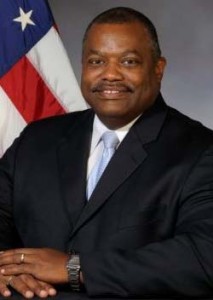Boosting and a Little Tough Love for Navy Buyers

Posted for The Patuxent Partnership
Pax Leader II
By Jay Friess
Federal contracting is a tough job right now. The rules seem to change almost daily, and the pressures of budget cuts are about to make negotiations between Navy buyers and private contractors much more difficult.
So, this week, The Patuxent Partnership and the National Contract Management Association Chesapeake Bay Chapter held a panel discussion with three senior contracting officials about the challenges and rewards of a federal contracting career at the Bay District Social Hall in Lexington Park, Maryland.
Diane Balderson, Assistant Commander for Contracts at the Naval Air Systems Command; Elliott B. Branch, Deputy Assistant Secretary of the Navy for Acquisition and Procurement; and Bruce Sharp, Acquisition and Contracting Specialist at MITRE had some good advice and a little tough love for an audience of hundreds of contract specialists.
Love it or leave it

Elliot B. Branch
Contracting is not for everyone, and it will make those who do not love it very unhappy.
“To me, the challenge is why you want to be in this field,” Ms. Balderson said. “It’s the patriotism and the principal result we get in this field that makes me want to stay in.”
“I love this business,” Mr. Branch said. “I really love this business. … If you don’t love this business, get out now. If you don’t, it’s a trap.”
“When I see something I’m buying, and it’s working, I’m excited,” Mr. Sharp said. However, he echoed Mr. Branch, saying, “If you don’t love it, you just got to get out of it.”
Both men said they got their start in accounting, which they detested. They both found that they loved contract negotiation, but noted that it takes a very specific mindset.
You might have to leave to get better at it
One questioner asked if there was a way for Navy buyers and contractors to learn each other’s jobs and get a better understand of the relationship.
“If you want to learn how the industry works, get up and go work for industry,” Mr. Branch said. “You are responsible for your own professional development.” He then acknowledged that it is the government’s responsibility to recognize when contracting professionals have gained significant skills in private jobs and consider re-hiring those individuals.
Roll with the punches

Bruce Sharp
One questioner asked how a contracting professional is supposed to do a good job, given that Congress keeps changing the rules and DoD issues new rule memos regularly.
“So you go deal with it,” Mr. Branch said, noting that law changes and evolving rules affect every other profession. “Why are you any different from any other professional? … Policies will come and policies will go.”
“All of the sudden, we have a smaller group of folks trying to get more done,” Mr. Sharp acknowledged. “Congress has been involved in our business more than they ever have.”
It can be hard to keep things in perspective, Mr. Branch said, noting that he once had an employee who didn’t find government contracting all that stressful. His previous job? Air traffic controller. “Stress is a relative thing,” Mr. Branch said.
Be skilled, not just credentialed
Do government contracts professionals need to get their Certified Professional Contracts Manager or Certified Public Accountant papers?
“I don’t believe in merit badges of any kind,” Mr. Branch said. “I don’t really think any of it is useful.”
Mr. Sharp said there is no substitute for on-the-job training.
“This isn’t a business you learn overnight,” he said. “You learn by doing. … Know your job. Never stop learning. … You’re either growing or you’re dying.” On the subject of mentors, he added, “I think you need a mentor, period. Unless you are a computer, you don’t know it all.”
Policy is guidance, not a replacement for common sense
Mr. Branch said policy is often drafted for people so they don’t have to think.
“You don’t believe everything you hear,” he said, adding that it is the duty of a contracts professional to think, to reason and to be flexible in the coming fiscal environment. “It’s going to be volatile, and we’re going to be called upon to be flexible. … Are you acting professionally, or are you truly a professional? … Your job is to make sure the system works with integrity.”
“If it doesn’t say ‘thou shalt not'” in the regulations, then it is permissible, Mr. Sharp said, getting a chuckle from the crowd.
You can disagree without being disagreeable
Mr. Sharp cautioned that nothing gets done when government buyers have an adversarial relationship with contractors. He advised the audience to use a soft touch and keep their power cards close.
“Why build bad relationships?” he asked. “We have to get smarter on how to deal with people.”























